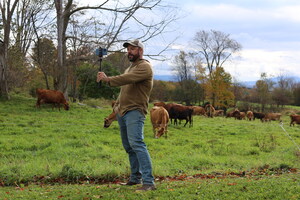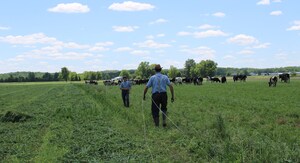LA FARGE, Wis., May 24, 2021 /PRNewswire/ -- Phase one of Organic Valley's dairy life cycle assessment (LCA) evaluated on-farm greenhouse gas emissions from dairy farms in a diverse range of climates using different management practices. The results are in: Farming practices of Organic Valley farmers have a measurable benefit for the planet, reinforcing the cooperative's commitment to bringing ethically made organic food to families everywhere.
University of Wisconsin-Madison's assessment reveals that, on average, the dairy farms of Organic Valley's members have a smaller carbon footprint than average U.S. conventional and organic dairy overall.
The most significant difference in calculations of the carbon footprint of Organic Valley milk is in the inclusion of carbon sequestration from pasture as well as from forage and crop production. Including carbon sequestration in the LCA reduced the net farm emissions of the cooperative's dairy farms by an average of 15%. On average, Organic Valley farmers report engaging in 50% more pasture grazing than that required by the National Organic Program, and the LCA results are impacted by this significant difference. In 2022, the full LCA will be completed, and Organic Valley will publish the overall impact of the cooperative's organic milk.
"This LCA represents the most comprehensive organic dairy environmental impact assessment in the United States completed to date. The LCA covers a wide range of regions and management practices and includes the development of an innovative accounting method for carbon sequestration by Dr. Aguirre-Villegas," said Dr. Rebecca Larson, UW - Madison professor.
In light of the study, the cooperative is debuting its commitment to a carbon-neutral supply chain by 2050 at New Hope's Expo West. The cooperative is setting milestones to reach the goal, aiming for 15% of the way to being carbon neutral by 2030 and 30% by 2035.
"Our LCA provides evidence of our lower-than-average farm carbon footprint. Our company-owned facilities are powered with 100% renewable electricity, and we're continually exploring ways to reduce the business's impact further," said Nicole Rakobitsch, director of sustainability at Organic Valley. "Together, our farms, our business, and our supply chain will reduce greenhouse gas emissions and sequester carbon."
Organic Valley is taking a direct, hands-on approach to carbon neutrality, as it plans to achieve its climate goal without purchasing external carbon credits. Instead of offsetting emissions with credits like many U.S. companies, the cooperative's efforts will reduce or eliminate emissions in the first place and maximize carbon sequestration on Organic Valley family farms across the country.
About Organic Valley
Organic Valley is America's largest cooperative of organic farmers and one of the nation's leading organic brands. Founded in 1988, the cooperative represents more than 1,700 farmers in 34 U.S. states, Canada, Australia and the United Kingdom and achieved $1.2 billion in 2020 sales. Focused on its founding mission of saving family farms through organic farming, Organic Valley produces a wide range of organic dairy, egg and produce products. As a leader in pasture-based, regenerative organic farming, Organic Valley works with nature, not against it. For more information visit www.organicvalley.coop. Organic Valley is also @OrganicValley on Instagram, Facebook, LinkedIn and Twitter.
Media Contact:
Elizabeth McMullen
[email protected]
608-632-6083
SOURCE Organic Valley

Related Links
WANT YOUR COMPANY'S NEWS FEATURED ON PRNEWSWIRE.COM?
Newsrooms &
Influencers
Digital Media
Outlets
Journalists
Opted In






Share this article